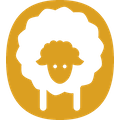About The Wool Channel

Hello! I'm Clara Parkes, founder of The Wool Channel (TWC).
I'm a New York Times-bestselling author, teacher, speaker, yarn critic, one-time lab coat wearer on PBS, sporadic Instagrammer, and unabashed wool advocate. If you've never heard of me, here's my Wikipedia entry.

I began writing about yarn and textile fibers in 2000. Over time, my focus shifted toward wool. I fell in love with the stories behind it, the sheep who grow it, the people who tend the sheep, and all the miraculous processes we've invented to transform this fiber into a usable material—not to mention the ingenious things we're doing with it.
Sheep and their wool have been vital partners in human existence for over 7,000 years. But the arrival of synthetic fibers and cheap fast fashion have driven wool to the edge of extinction. Wool barely represents two percent of the textile fibers we wear. It has no voice in the world anymore.
Consumers have been made reliant on an extractive and unsustainable system of cheap clothing that is fueled by non-biodegradable fibers made from virgin petroleum. This clothing is made in countries with lax labor laws and environmental regulations, for companies whose entire ethos is profit.
This system will continue to thrive until consumers stop funding it, and until we collectively shift back toward natural fibers—especially wool, which gives so much back to the planet from which it comes.
My mission with The Wool Channel is to build a consumer movement that gives wool a voice in the world again.
The Wool Channel has two public-facing components
The Wool Wire, a biweekly email newsletter that explores and explains the latest news and innovations in the wool world. If you're new to wool or not ready to commit, this is a great place to start.

Wool Shorts on YouTube, tackling one wool concept or fact or news piece in five minutes or less. Here's a recent one.
Who's paying for this?
Everything that happens on TWC is funded by a paid membership program, called the Foundation Flock.
In addition to the Wool Wire and Wool Shorts, Foundation Flock members enjoy
- Quizzes on geeky wool subjects, ranging from sheep to science to innovation and history
- A month-end livestream Flock Talk with me
- Last but certainly not least, members get a golden key to our members-only playground, reading club, wool resource guide, and networking tool: TWC Community. It even has an iOS app—how cool is that?
No matter what your interests or where you are on your wool journey, TWC has a place for you. We're headed deep into Wooltopia, and I'd love to have you on board. Let's learn, celebrate, help spread the good word, and elevate wool to its rightful place in our global conversation.
Why wool?
Wool is nature's original miracle fiber. We know this. It insulates and breathes and quiets and purifies and extinguishes, and at the end of the day, it's happy to return to the soil as mulch for your garden. Sheep are superheroes. When their grazing is managed with forethought, those superheroes can improve the health of the planet.
But wool is in trouble.
Not only does wool make up less than 2% of what we wear, but it’s been replaced by petroleum-based synthetics that are slowly choking the planet. We’ve moved so far from a wool world that a large chunk of the population doesn’t even think of a sheep when you say the word “fleece.” Upload a sheep-shearing video and Instagram will slap a "violent content" warning label on it.
The world has lost its wool knowledge.
We’re also coming to terms with the humanitarian, economic, and environmental consequences of fast fashion and climate change. Every day, well-intending consumers are being convinced that the kindest fiber on earth is, in fact, the cruelest—and they should strap recycled soda bottles to their bodies instead.
Meanwhile, the gorgeous, exciting, nuanced, and richly storied world of wool longs to be explored and celebrated. The people and places. The extraordinary inventions and ongoing innovation. The myriad ways in which wool is intertwined in our language, culture, religion, and literature. Ten thousand years of human history.
It's time to elevate wool to its rightful position in our larger cultural conversation. To build a strong, informed, passionate network of consumers who can advocate for wool in the world.
